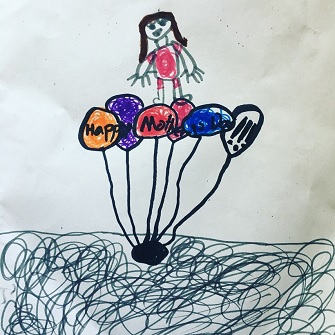26/05/2017
Leah Garces, Compassion's USA Executive Director tells us why this year's Mother's Day card provided her with some real food for thought.
This Mother’s Day, my precocious, sensitive nine-year old son made me a card. When I opened it up, I wasn’t sure what I was seeing.
It was a drawing of me, standing atop a mass of floating, multicolored balloons that spelled out “Happy Mother’s Day.” Below the message was confusing gray scribble. I have a folder in my closet of cards that he’s made me for various occasions - birthdays, Valentine’s Day, and Mother’s Day. As he’s grown older, he’s put more thought into them.

“This is wonderful,” I told him. “But what is that grey stuff at the bottom?”
He looked at me with his sweet hazel eyes and said, simply: “The grey is the pollution and the balloons are for you to ride away to another planet and be saved.”
Deep breath.
On one hand, that he wanted to rescue me from such a horrible fate was undeniably sweet. But on the other hand, I couldn’t help but feel overwhelmed by one alarming thought:
We have to do better, faster, right now.
And in this line of work, it has become increasingly clear to me that there is one simple thing we can all do to turn this giant shipwreck around: choose better food.
As Philip Lymbery’s new book Dead Zone: Where the Wild Things Were (out in hardback in the USA on June 20th) explores, in the last 40 years, the total number birds, amphibians, mammals, and reptiles that populate our global ecosystems has halved. The primary culprit: global demand for food.
Specifically: factory farming of beef, dairy, eggs, pork, and chicken.
In getting our food from farm to plate, our practices are inconceivably shortsighted: we over-farm our dwindling arable land, we overuse our drinkable water, and we cut down ecologically important habitats—like rainforests—all to feed animals on factory farms. We use miles of valuable land to grow soy, maize, and wheat that could be used to feed humans directly, and instead feed it to animals cruelly crammed into warehouses.
Collectively, farmed animals emit a higher volume of greenhouse gases than the world’s planes, trains, and cars combined. The average American’s food choices produce the same amount of greenhouse gases as that person’s energy use. And taken together, the numbers are even more staggering: according to a 2016 study, animal-based foods in the American diet accounted for about 85 percent of food-related greenhouse gas emissions in 2009, and about 90 percent of all agricultural land use. Yet, the global livestock population is expected to double by 2050, solely due to global demand for cheap meat.
What we really need is a food system reboot. We need a food system that isn’t sending us on a one-way trip to self-destruction.
What does that look like? Greenpeace CEO John Sauven offered some helpful words recently: “The most sustainable option is much smaller quantities of higher-quality, mainly grass-fed meat, along with less dairy, more fruit and vegetables, and less processed food. How much less meat? A lot less. Unless, that is, you can persuade all of your friends to go vegan.”
Unlike my son’s card, there are no escape hatches, other planets, or balloon rides away from this place we call home (at least not yet). The chickens—literal and metaphorical—have come home to roost. Faced with the consequences of our actions, it’s now our job to undo what we’ve done and hand our kids a better planet.
The solution is right at the end of our forks.
